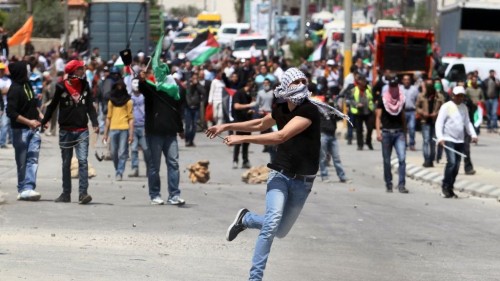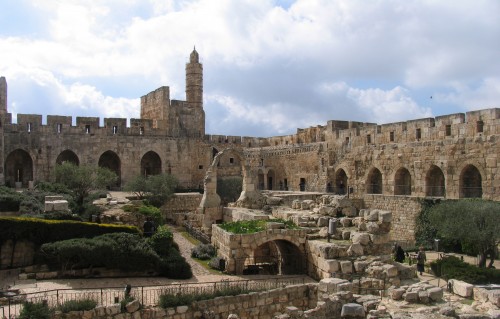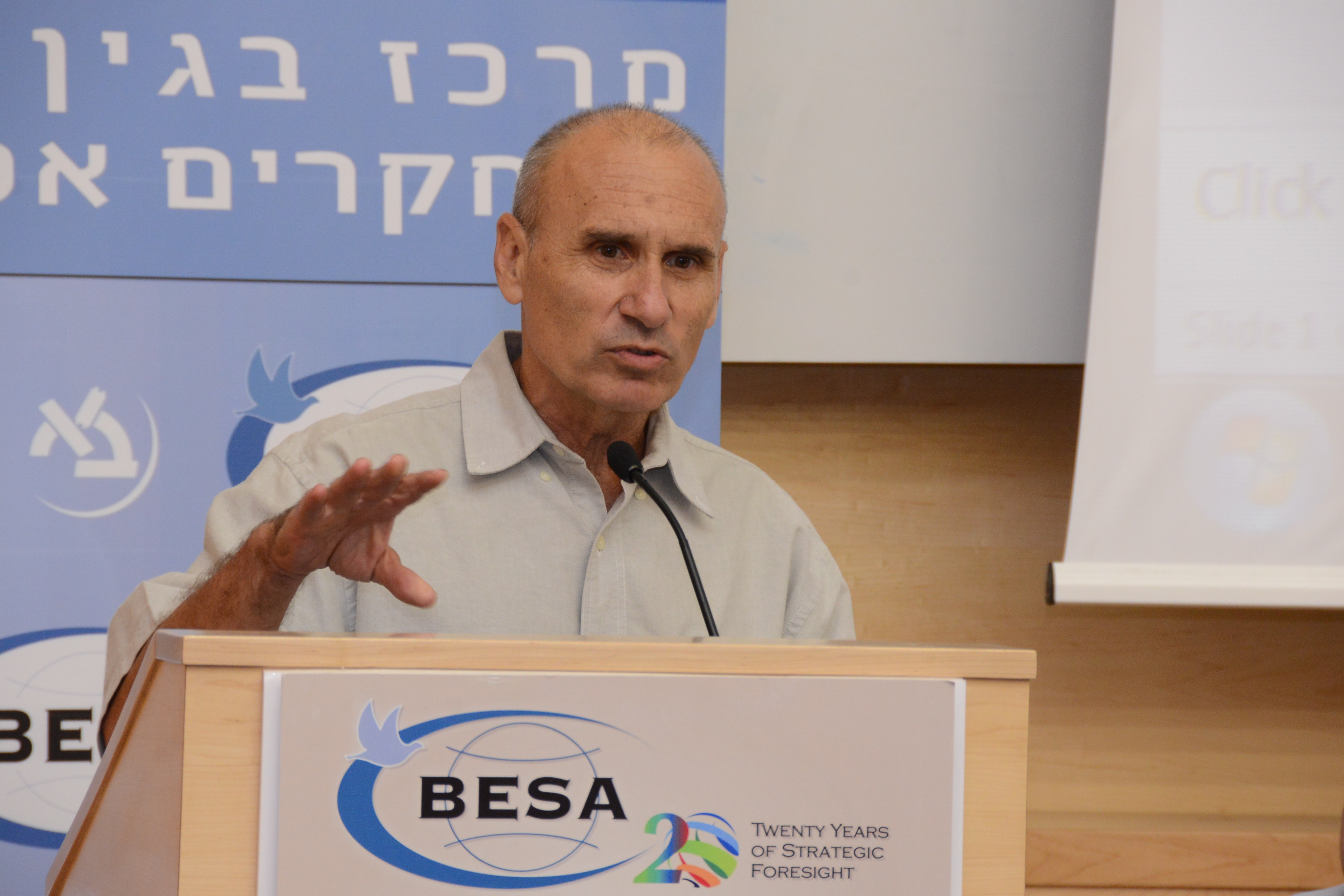ISRAEL MUST REACQUIRE SUFFICIENT IDEOLOGICAL DETERMINATION TO PERSEVERE, PROGRESS, REPULSE, AND OVERWHELM ITS ADVERSARIES
by Major General (res.) Gershon Hacohen
Part 1. Proactive Redemption in Responding to Palestinian Violence

EXECUTIVE SUMMARY: Those who view Israel as a stepping stone for redemption and as the Jewish national spiritual homeland will act differently in responding to Palestinian violence than those who view Israel merely as a safe haven. Thus, the government should do more than just approve security operations against the terrorists. It should approve increased construction in Judea and Samaria and in Jerusalem.
The ongoing discourse among Israeli cabinet members and, to a large extent among settler leaders, has been largely over how to provide security to Israelis. While this is obviously a valid objective, it has nevertheless locked Israel into a defensive posture.
Israel's defense doctrine, devised by Israel's first prime minster, David Ben-Gurion, seeks to transfer the battlefield into enemy territory, in part because Israel's narrow borders makes defensive maneuvering difficult. But the main reason why Ben-Gurion favored this approach was his belief that to win a war, even a defensive war, Israel had to seize the initiative. In other words: Israel must be proactive, rather than, reactive.
It is not enough to arrest those who killed Israelis after they perpetrated their crime. When you call such crimes terrorism, it blurs the need to figure out what the terrorists tried to achieve. Even if it is hard to pinpoint exactly who the masterminds are, the attacks create a trend that undermines Israel's strategic and vital interests and its very sovereignty in its capital.
Under the government's defensive strategy, the Israel Defense Forces is tasked with providing security. The government expects the IDF to take a series of steps to respond to the situation, with the expectation that the overall operational effect would lead to the ebbing of violence. But reality is more complex. When the Palestinians create a reality in which certain areas are essentially off bounds for Jews — as has been the case in the current reality we live in — they consider it an accomplishment.
Helping a derailed train get back on track is a technical solution that restores order. The job is done when the train resumes normal operation. But when it comes to the complex relations between human beings, even when calm is restored, a new reality is created.
In this part of the world, to reshape reality according to one's preference, a proactive and strategic initiative is necessary. It is incumbent upon us to subscribe to a new modus operandi to effect the desired change by departing from the reactive pattern of behavior.
But what kind of proactive action would serve Israel in the current state of affairs?
This question puts Israel is a critical crossroad that could define the very essence of our presence on this land: Do we want Israel to be a homeland where Jerusalem serves as the linchpin of statehood, with all the religious and national implications; or do we simply want a country that serves as a safe haven for persecuted Jews and is recognized by the international community?
At the height of the War of Independence, in 1948, Ben-Gurion explained why he set the capture of Jerusalem as a primary objective in the war. Speaking before the Zionist General Council, he said, "I don't need to tell you what value Jerusalem has had in the history of the Jewish people and the land of Israel and world. ... If a land has a soul, then Jerusalem is the soul of the land of Israel, and the battle for Jerusalem is paramount, not just in a military sense. ... We are duty bound to stand by Jerusalem, and it deserves it. The pledge we took on the rivers of Babylon is binding now as it was binding then, otherwise we would no longer be able to call ourselves the people of Israel."
Indeed, that pledge is recited by every Jewish groom: "If I forget thee, O Jerusalem, let my right hand forget her cunning." Jerusalem is a point in the universe that encapsulates the Jews' religion, nationhood and polity. The Palestinians also consider it as their national focal point. That is why the city has fueled this current conflagration.
In light of this reality, the government should do more than just approve the security establishment's operational plans. Proactive measures are required that go beyond the authority of security authorities. At the strategic level, the situation calls for increased construction in Judea and Samaria and in Jerusalem. Such action will serve the national interest, not just a narrow sectarian interest.
At this critical juncture, those who view this land and country as a stepping stone for redemption and as a national homeland will act differently than those who view Israel merely as a safe haven. We have to make fateful choices that will shape our future here, and our decision should be clear.
Part 2. Is Jerusalem Divided?

EXECUTIVE SUMMARY: Conflicts and clashes are not unique to Jerusalem. In Paris, too, there are neighborhoods one would do well to avoid, but no-one is claiming that Paris needs to be divided as a result. Indeed, Jerusalem is the DNA that holds the key to the future of Israel. Those incapable of dividing Jerusalem are also incapable of dividing the land into two states. Israel needs to know why Jerusalem should be a priority; because it is seeking the return to Zion in all regions of the homeland! And if Israel does not insist on this, it will steadily withdraw inward, toward the coastal plain, and edge towards decline.
A significant portion of the media has told us in recent days that the time has come to realize that Jerusalem has been divided for quite a while already. Some of the newspaper headlines were: "The capital is becoming a ghost town," (Ben Caspit, Maariv), and "Netanyahu is dividing Jerusalem" (Sima Kadmon, Yediot Ahronot).
In my view, however, even if Jerusalem appears, at the present time in light of recent events, to be splintering into different parts for Arabs and Jews, this does not necessarily reflect the overall picture and certainly does not indicate future trends. In short: What is happening now is not what will necessarily be, and it is hard to precisely foresee how matters will unfold in Jerusalem.
During a meeting of American and Vietnamese generals after the Vietnam War, both sides agreed that even though the U.S. military had won all the battles, America had lost the war. This is the fundamental distinction between war as a complex phenomenon and say, sports — where the final score and final result always coincide. In sports there is no option of losing the game while still winning the championship title. War and national struggles are something different. They have a "day after," which is open to developing in a number of ways.
Indeed, the situation has changed. In Jerusalem roadblocks have been erected and checkpoints have been placed at the entrance to some of the neighborhoods. But does this qualify as an irreversible process?
A city the size of a metropolis is characterized by a dynamic of ongoing change. During processes of urban transformation, which develops with no conflict to speak of, poor neighborhoods suddenly become in demand as their appearance changes along with their population; sometimes the opposite takes place. A city as a fluctuating entity can tolerate space-altering struggles, which are inherently susceptible to counter processes.
Despite the special attention it receives, conflicts and clashes are not unique to Jerusalem. In Paris, too, there are neighborhoods one would do well to avoid, where the Paris police department also fails to administer full sovereignty. Is anyone claiming that Paris needs to be divided as a result? Only in recent years did the New York police department manage to gain complete control of the entire city, but does that mean that when Harlem was deemed unsafe for some people, others were arguing that the city must be divided?
It is interesting to point to the nature of the debate surrounding Jerusalem. I have not found even a single person who has changed his opinion about the future of Jerusalem because of recent events. Both sides are in conflict over the city's future, and regarding the questions over its division, each side has found support for its beliefs in recent weeks.
There are those who wish to be rid of the problematic neighborhoods. They ask me: "What is Jerusalem for you? Is the village of Akeb also Jerusalem?" My answer is clear: In my view of Jerusalem as a metropolis, Jericho is also Jerusalem, and what will determine Jerusalem's status is not just what happens within its municipal boundaries but what happens and will happen in the future in its environs.
What will determine its future is also Jerusalem's bond with the fabric of the communities encircling it, near and far. This is the essence of the strength of a city that has never been defined by its trends, rather by how it defines itself. It exists amid a reality which changes inside the city and outside it on a daily basis.
The fate of Jerusalem as a capital will be determined, therefore, by the comprehensive system of bonds it maintains with the city's satellite communities, Jewish and Arab. Strengthening the fabric of the metropolitan area outside the city proper could also influence conflict flashpoints in neighborhoods inside the city.
The fundamental question at the moment is what we want to see happen. Indeed, Jerusalem is the DNA that holds the key to the future of the entire country. Those incapable of dividing Jerusalem are also incapable of dividing the land into two states.
Here is where the debate begins about any course of action on the table. Israel is at a fork in the road, and anything is still possible. We need to know what we are really focusing on by making Jerusalem our priority. We are seeking the return to Zion in all regions of our homeland! And if Israel does not insist on this, it will steadily withdraw inward, toward the coastal plain, and edge towards decline.
Part 3. A January 4, 2016 BESA essay summing up Hacohen's views

"Restoring calm" in Jerusalem and the West Bank (through anti-terrorist operations, fences, roadblocks etc.), Hacohen says, is akin to putting a derailed train back on track — no more. It is a technical solution, not a goal-oriented chess move that drives a new reality. The Zionist movement always sought to, and today too should seek to, reshape Israel's strategic reality according to its preferences.
He sees settlements as forward outposts of Zionism, in addition to their being critical to Israel's military deployment in the territories. "Where there is a farmer on his land," he says, "the army has the strength to rule."
Unlike so many of his left-leaning former military colleagues, Hacohen is utterly opposed to the establishment of a Palestinian state in the West Bank, and equally opposed to any further unilateral withdrawals too.
Underlying Hacohen's weltanschauung is the notion of ongoing struggle, and deep faith in the righteousness of the Jewish return to Zion.
This first part of this thought-process is somewhat Bolshevik in approach: Israel is engaged in a permanent revolution. Consequently, Hacohen says, Zionism must constantly seek to re-shape and shake-up the strategic environment, never giving up on its ideals despite strategic and tactical difficulties. Even if Israeli leaders can't see where the struggle might lead, they are nevertheless mandated to push forward, says Hacohen.
You shuffle the cards and create facts on the ground. And then, drawing on passionate commitment that comes from true belief in your cause — religious-nationalist faith in the justice of Zionism — have confidence that the Heavens will help stickhandle the helm of state.
"Our enemies such as ISIS and Iran are resolutely motivated by revolutionary ideologies," says Hacohen. "In this situation, Israel can't get by with leaders bereft of ideological zeal; stuck in a holding pattern or in a management mindset. Israel must reacquire sufficient ideological determination to persevere, progress, repulse, and overwhelm its adversaries."
Maj. Gen. (res.) Gershon Hacohen recently joined the Begin-Sadat
Center for Strategic Studies as a senior research associate. He
served in the IDF for 42 years, commanding troops in battle on
the Egyptian and Syrian fronts. He was a Corps commander, and
commander of the IDF Military Colleges. He had the excruciating
experience of being in charge of the expulsion of the Jews from
Gaza in 2005, despite his personal views. He did not resign. He
saw to it that the basic objective of the expulsion — not
security but the desire
of the Left to destroy religious Judaism — was not fulfilled.
In the words of Caroline Glick (Jerusalem Post, 23July2015),
For the Left's plan to succeed, the expulsions had to be perceived by the public as a physical and ideological clash between the settlers and the soldiers.
Hacohen worked to prevent the public from receiving that impression. Rather than prepare the soldiers for a clash with the settlers, Hacohen set up the expulsions as a national tragedy which the soldiers and the settlers would experience together. To this end, in the weeks before the expulsions, Hacohen ordered his officers and soldiers to mingle inside the communities of Gush Katif they were set to evacuate. Rather than treat the villages as hostile zones, soldiers and officers were given the opportunity to see that the settlers were no different from them.
By the time the expulsions were carried out, the soldiers felt
little alienation from the settlers. Consequently, the clash the
Left anticipated never happened.
Last year he published What's National in National Security (Hebrew: Ministry of Defense Publishing House), which is a discourse on values and vision in the crafting of national security doctrine.
Part 1 is BESA Center Perspectives Paper No. 310, October 11, 2015. It was originally published in Israel Hayom. Part 2 is BESA Centers Perspectives Paper No. 316, October 25, 2015. An abridged version appeared in Israel Hayom on 22.10.2015.